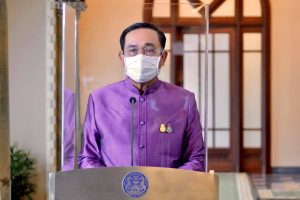Thailand’s Prime Minister Prayut Chan-o-cha has survived his third parliamentary vote of no-confidence, stabilizing his government, at least momentarily, as it weathers a storm of criticism for its botched handling of the COVID-19 pandemic.
As expected, Prayut and five members of his cabinet won votes of confidence in Parliament on Saturday, after nearly a week of debates and small but persistent protests seeking the Thai leader’s resignation.
According to the Associated Press, Prayut prevailed relatively comfortably in the 482-seat lower house of Parliament, gaining support from 264 of the 271 lawmakers that make up his ruling coalition. Some 208 parliamentarians voted in support of the motion, 34 short of the simple majority of 242 that the opposition needed to succeed.
While the prime minister survived with a healthy margin, the debate took place against the backdrop of rumors that secretary-general of Prayut’s Palang Pracharath party, a proxy of the military, might use the vote to unseat him, appoint an alternative prime minister, and pull the main opposition Pheu Thai party into its ruling coalition.
Prayut, the former commander in chief of the Thai army, came to power in a coup in May 2014 and ruled for five years by fiat. He then adopted a civilian guise after the election in March 2019, but given the highly flawed and circumscribed nature of the election, based on the patently undemocratic constitution drafted and passed by his military junta two years earlier, the transition back to “democratic” rule has done little to address his steep legitimacy deficit.
The flawed election, which was followed in early 2020 by the outlawing of the popular Future Forward party, which had won the third-most votes in the election, helped spark the campaign of large youth-led public demonstrations that surged through the second half of last year. The protests demanded Prayut’s resignation, the creation of a genuinely democratic constitution, and root-and-branch reforms to the untouchable power of the Thai monarchy.
The protests have since shifted tack amid rising COVID-19 cases and a fierce legal offensive by the Thai authorities, narrowing their focus from controversial issues like reform of the monarchy to the government’s concrete missteps in handling the pandemic. In particular, critics claim that the government wasted the head-start that Thailand gained through the successful containment of the virus in 2020.
More than 12,000 people have died of COVID-19 in 2021, compared to fewer than 100 last year. The economy has been ravaged, and the country’s important tourism industry has ground to a halt. Opposition members and protesters also blame the government for failing to secure adequate supplies of vaccines, and placing their hopes on a local production deal that has been marred by delays and a lack of transparency.
The street politics has also been paralleled by efforts of opposition parties to tighten the screws on Prayut. Saturday’s no-confidence motion was the third that the leader has survived since the 2019 election, and the debate that preceded the vote featured excoriating criticism of his character. Sompong Amornvivat, leader of the opposition Pheu Thai party, opened the debate on August 31 with a broadside in which he described Prayut as “a power-crazed arrogant person unsuitable to lead the country.”
Throughout this week’s debates, the organizers of the recent anti-government street protests took the opportunity presented by the vote to revive their own political campaign, holding daily demonstrations demanding Prayut’s resignation.
On Sunday, the day after the vote, protesters gathered once again in Bangkok to renew their call for the leader to step down, in addition to wider political reforms. More than 1,000 people gathered peacefully at the busy Asoke intersection in the center of the city, according to the Associated Press, while a militant faction clashed with police elsewhere.
While Prayut survived the vote, and the rumors of a plot within his own coalition to remove him turned out to be unfounded, Saturday’s vote did nothing to resolve the fundamental lack of legitimacy with which many Thais – both inside and outside the political system – view Prayut’s administration. Barring substantial political reform, even a new election is unlikely to address this shortfall, ensuring that the perpetual political crisis in Thai politics continues for the foreseeable future.

































